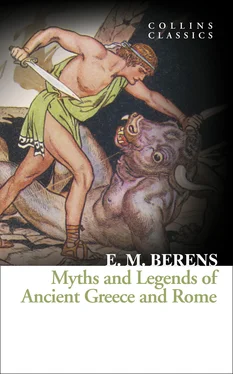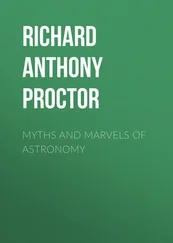Anxious to preserve the secret of his existence from Cronus, Rhea sent the infant Zeus secretly to Crete, where he was nourished, protected, and educated. A sacred goat, called Amalthea, supplied the place of his mother, by providing him with milk; nymphs, called Melissae, fed him with honey, and eagles and doves brought him nectar and ambrosia. [4]He was kept concealed in a cave in the heart of Mount Ida, and the Curetes, or priests of Rhea, by beating their shields together, kept up a constant noise at the entrance, which drowned the cries of the child and frightened away all intruders. Under the watchful care of the Nymphs the infant Zeus throve rapidly, developing great physical powers, combined with extraordinary wisdom and intelligence. Grown to manhood, he determined to compel his father to restore his brothers and sisters to the light of day, and is said to have been assisted in this difficult task by the goddess Metis, who artfully persuaded Cronus to drink a potion, which caused him to give back the children he had swallowed. The stone which had counterfeited Zeus was placed at Delphi, where it was long exhibited as a sacred relic.
Cronus was so enraged at being circumvented that war between the father and son became inevitable. The rival forces ranged themselves on two separate high mountains in Thessaly; Zeus, with his brothers and sisters, took his stand on Mount Olympus, where he was joined by Oceanus, and others of the Titans, who had forsaken Cronus on account of his oppressions. Cronus and his brother-Titans took possession of Mount Othrys, and prepared for battle. The struggle was long and fierce, and at length Zeus, finding that he was no nearer victory than before, bethought himself of the existence of the imprisoned Giants, and knowing that they would be able to render him most powerful assistance, he hastened to liberate them. He also called to his aid the Cyclops (sons of Poseidon and Amphitrite), [5]who had only one eye each in the middle of their foreheads, and were called Brontes (Thunder), Steropes (Lightning), and Pyracmon (Fire-anvil). They promptly responded to his summons for help, and brought with them tremendous thunderbolts which the Hecatoncheires, with their hundred hands, hurled down upon the enemy, at the same time raising mighty earthquakes, which swallowed up and destroyed all who opposed them. Aided by these new and powerful allies, Zeus now made a furious onslaught on his enemies, and so tremendous was the encounter that all nature is said to have throbbed in accord with this mighty effort of the celestial deities. The sea rose mountains high, and its angry billows hissed and foamed; the earth shook to its foundations, the heavens sent forth rolling thunder, and flash after flash of death-bringing lightning, whilst a blinding mist enveloped Cronus and his allies.
And now the fortunes of war began to turn, and victory smiled on Zeus. Cronus and his army were completely overthrown, his brothers despatched to the gloomy depths of the lower world, and Cronus himself was banished from his kingdom and deprived for ever of the supreme power, which now became vested in his son Zeus. This war was called the Titanomachia, and is most graphically described by the old classic poets.
With the defeat of Cronus and his banishment from his dominions, his career as a ruling Greek divinity entirely ceases. But being, like all the gods, immortal, he was supposed to be still in existence, though possessing no longer either influence or authority, his place being filled to a certain extent by his descendant and successor, Zeus.
Cronus is often represented as an old man leaning on a scythe, with an hour-glass in his hand. The hour-glass symbolizes the fast-fleeting moments as they succeed each other unceasingly; the scythe is emblematical of time, which mows down all before it.
The Romans, according to their custom of identifying their deities with those of the Greek gods whose attributes were similar to their own, declared Cronus to be identical with their old agricultural divinity Saturn. They believed that after his defeat in the Titanomachia and his banishment from his dominions by Zeus, he took refuge with Janus, king of Italy, who received the exiled deity with great kindness, and even shared his throne with him. Their united reign became so thoroughly peaceful and happy, and was distinguished by such uninterrupted prosperity, that it was called the Golden Age.
Saturn is usually represented bearing a sickle in the one hand and a wheat-sheaf in the other.
A temple was erected to him at the foot of the Capitoline Hill, in which were deposited the public treasury and the laws of the state.
Rhea, the wife of Cronus, and mother of Zeus and the other great gods of Olympus, personified the earth, and was regarded as the Great Mother and unceasing producer of all plant-life. She was also believed to exercise unbounded sway over the animal creation, more especially over the lion, the noble king of beasts. Rhea is generally represented wearing a crown of turrets or towers and seated on a throne, with lions crouching at her feet. She is sometimes depicted sitting in a chariot, drawn by lions.
The principal seat of her worship, which was always of a very riotous character, was at Crete. At her festivals, which took place at night, the wildest music of flutes, cymbals, and drums resounded, whilst joyful shouts and cries, accompanied by dancing and loud stamping of feet, filled the air.
This divinity was introduced into Crete by its first colonists from Phrygia, in Asia Minor, in which country she was worshipped under the name of Cybele. The people of Crete adored her as the Great Mother, more especially in her signification as the sustainer of the vegetable world. Seeing, however, that year by year, as winter appears, all her glory vanishes, her flowers fade, and her trees become leafless, they poetically expressed this process of nature under the figure of a lost love. She was said to have been tenderly attached to a youth of remarkable beauty, named Atys, who, to her grief and indignation, proved faithless to her. He was about to unite himself to a nymph called Sagaris, when, in the midst of the wedding feast, the rage of the incensed goddess suddenly burst forth upon all present. A panic seized the assembled guests, and Atys, becoming afflicted with temporary madness, fled to the mountains and destroyed himself. Cybele, moved with sorrow and regret, instituted a yearly mourning for his loss, when her priests, the Corybantes, with their usual noisy accompaniments, marched into the mountains to seek the lost youth. Having discovered him [6]they gave full vent to their ecstatic delight by indulging in the most violent gesticulations, dancing, shouting, and, at the same time, wounding and gashing themselves in a frightful manner.
In Rome the Greek Rhea was identified with Ops, the goddess of plenty, the wife of Saturn, who had a variety of appellations. She was called Magna-Mater, Mater-Deorum, Berecynthia-Idea, and also Dindymene. This latter title she acquired from three high mountains in Phrygia, whence she was brought to Rome as Cybele during the second Punic war, B.C. 205, in obedience to an injunction contained in the Sybilline books. She was represented as a matron crowned with towers, seated in a chariot drawn by lions.
We will now return to Zeus and his brothers, who, having gained a complete victory over their enemies, began to consider how the world, which they had conquered, should be divided between them. At last it was settled by lot that Zeus should reign supreme in Heaven, whilst Aïdes governed the Lower World, and Poseidon had full command over the Sea, but the supremacy of Zeus was recognized in all three kingdoms, in heaven, on earth (in which of course the sea was included), and under the earth. Zeus held his court on the top of Mount Olympus, whose summit was beyond the clouds; the dominions of Aïdes were the gloomy unknown regions below the earth; and Poseidon reigned over the sea. It will be seen that the realm of each of these gods was enveloped in mystery. Olympus was shrouded in mists, Hades was wrapt in gloomy darkness, and the sea was, and indeed still is, a source of wonder and deep interest. Hence we see that what to other nations were merely strange phenomena, served this poetical and imaginative people as a foundation upon which to build the wonderful stories of their mythology.
Читать дальше












